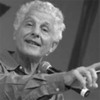Phyllis Trible
Author of Texts of Terror: Literary-Feminist Readings of Biblical Narratives
About the Author
Phyllis Trible is a renowned scholar in the field of feminist biblical scholarship. She has served as the Baldwin Professor of Sacred Literature, Union Theological Seminary, New York, as well as associate dean, professor of biblical studies, and university professor at Wake Forest University, show more Winston-Salem, North Carolina. Her groundbreaking books include God and the Rhetoric of Sexuality and Rhetorical Criticism. show less
Works by Phyllis Trible
Hagar, Sarah, and Their Children: Jewish, Christian, and Muslim Perspectives (2006) — Editor; Editor — 84 copies, 2 reviews
Associated Works
Wise Women: Over Two Thousand Years of Spiritual Writing by Women (1996) — Contributor — 209 copies, 1 review
Tagged
Common Knowledge
- Birthdate
- 1932-10-25
- Gender
- female
- Nationality
- USA
- Places of residence
- Richmond, Virginia, USA (birthplace)
- Occupations
- Theologian
Members
Reviews
Lists
You May Also Like
Associated Authors
Statistics
- Works
- 16
- Also by
- 7
- Members
- 1,200
- Popularity
- #21,382
- Rating
- 4.0
- Reviews
- 6
- ISBNs
- 17
- Languages
- 2
- Favorited
- 1












